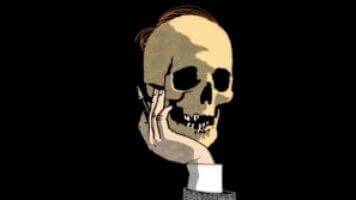Writers imagining interviews with dead cultural icons is nearly a complete disaster

Plenty of books rest on a shaky premise. A book about business written by a crook, an allegory about abstinence disguised as a vampire fantasy, or the plot of any Nicholas Sparks novel work because of something beyond their basic thrust, be it the sweat of a talented ghostwriter, irresistible forward momentum, or romance fantasy fulfilled. These books sell because their purpose is both vague and broad, their appeal simplistic and easily translated. Then there are the books that never rise above the shaky premise. Dead Interviews: Living Writers Meet Dead Icons’ conceit is to have living authors pretend to talk to dead ones. And it’s a complete waste of time.
The first alarm bell is Dead Interviews editor Dan Crowe’s terse introduction addressing the credibility of such a project, which includes the guiding questions for the interviews: “Where are they? Is there a god? How scared should we be?” If several millennia of discourse haven’t resulted in satisfactory answers to these questions, why on earth would Rick Moody’s interview of a dead Jimi Hendrix clear the path? His “exchange” with Hendrix starts the book, with the former, a white man, writing what he believes a black man would sound like. The late guitarist’s first answer: “A cat up here has lots of time to consider, to ponder larger questions.… Dig: beliefs that adhere to your theory of relativity, space-time being curved, clumping, superstring theories, all true.” If this was Moody’s first draft of a below-average Saturday Night Live sketch, that sort of language would be fine. But he’s hazarding a guess as to what Hendrix would say to him from beyond the grave, and is almost certainly not qualified to be the recipient of such information, nor the person to transliterate it.
Cynthia Ozick’s “interview” of Henry James, on the other hand, is baffling and unwieldy. She is hung up on asking about the tabloid-worthy episodes of his past, but never establishes why this is an important line of questioning. These authors may be angling to interview the dead, but they make no case about why we should care.
A.M. Homes invents a proxy: Tom lived next door to the Nixons when he was a child. I hope their fake memories of neighborly kindness are fondly remembered because their written recollections are the equivalent of someone’s very nice mother interviewing America’s favorite disgraced Republican. Sir Arthur Conan Doyle is subjected to Harry Potter-style teleportation by Ian Rankin: “Whoooshh” carries them from monument to monument in Edinburgh, and more fatal than these fanciful flourishes is Rankin’s decision to turn Conan Doyle into a reader of his own work. Is there a greater act of vanity than having an internationally renowned (and deceased) writer say that he’s read your stories?
Filmmaker Rebecca Miller countermands the chance for cleverness or nuance for her exchange with the Marquis De Sade within a few lines:
Marquis De Sade: “Who gave you my address?”
Rebecca Miller: “Inspector Buhot.”
